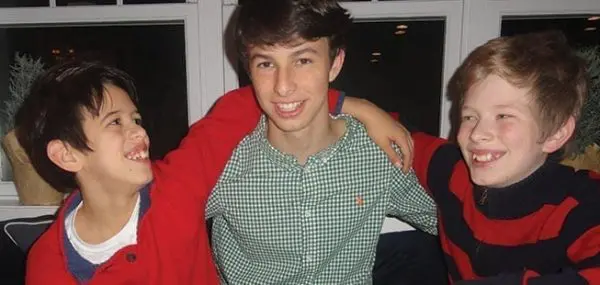Sibling Rivalry Advice
Bickering. Yelling. Whines of “It’s not fair.” Tattling. Sibling rivalry can (seriously) annoy even the most even-keeled parents. Here a mom and her daughter each give their perspectives, and some of our favorite experts have advice for parents on dealing with sibling rivalry.
PARENT | Elisa Torres
I could feel the heavy energy in the air as the girls purposefully ignored one another at every opportunity. Their rivalry isn’t loud. It’s the silence that signifies there is tension between these two normally fun-loving sisters. And today that tension was visible. It was visible in the pursed lips and clenched jaw of the eldest and in the tears coursing down the cheeks of the youngest.
Briana had asked why the kitchen chores weren’t finished. Naomi bit out something that included the words “…and it’s not fair!” and went to her room and closed the door firmly. I watched them avoid conversation and interaction for an hour. I was tempted to intervene and try to help them solve the disagreement, but I also wanted them to resolve this conflict on their own. It was a dilemma because I felt a deep need to have the peace and joy in our home restored for the sake of all.
Both sisters are singers, and ironically, we were in the middle of producing an album celebrating the connection between parents and children. This conflict had come during a week of many scheduled events: high school play practices until 9:00 p.m. each night, choir recital, music production meetings in the home, studio recording sessions, even serving the homeless in the local soup kitchen. Everyone had a full plate, and evidently our collective plates had overflowed in the kitchen that evening.
When they were younger and dealing with sibling rivalry, I would assign them certain “Togetherness Chores” so that they might work side-by-side on a common goal until their emotions settled down. Usually those chores ended with both of them giggling and making plans for playtime afterwards. Togetherness Chores do not seem to work anymore. On this day, I asked Briana to resolve it herself.
Sibling Conflict Resolution
Instead of talking it out with her sister, she decided to clean the kitchen herself. In the interest of allowing her to find her own way in life, I often let her do things that I might not agree with. Doing her sister’s chores that night was not what I considered the best choice, but I stayed quiet. A few minutes later, Naomi came out. She stood in the kitchen, turned a full circle observing all, then came to me with a kiss and a sweet “Thank you, Momma!” I kissed her back and said, “Don’t thank me, thank your sister. She did your chores.”
They talked, and she did thank her sister, but the best part of the conflict was hearing her explain why she felt that the chore load was unfair that particular week. It actually made sense once she articulated it for us. She was overwhelmed with school activities and felt the need for her home time to be restful. It helped me to realize that, even though they are becoming adults, I sometimes need to be more cognizant of the areas where they are still “kids” and I need to intervene on their behalf.
Elisa Torres is a single mom, former homeschooler, writer, singer/songwriter, and life coach. Tune in to her twice-weekly CoffeeChat on Facebook or follow her on Facebook at One More AMAZING Day.
TEEN | Bree Torres
Two weeks ago, we sat down as a family and, once again, tried to figure out what to do about the mess in our home. We are students, artists, and singer/songwriters, and our home is also our production studio and practice place. With all the comings and goings of us and others in our lives, the house seems perpetually cluttered. Coffee cups and music sheets usually adorn the end tables, and pots from last night’s dinner still sit on the stove. The living room shows signs of life as well: scattered throw blankets, game boards, and empty popcorn bowls.
Although to the casual observer, this may not look like much, it’s a constant source of tension. Between working, school, the album, choir, plays, and everything else that goes on, there never seems to be enough time set aside to clean up the house. There we were, one week after trying to set down rules as to who cleans the kitchen on specific nights. I’d come home from class to a messy kitchen and a frustrated mom because, once again, the chores hadn’t been done. I angrily went to my sister’s room and asked why she hadn’t done them, as it was her night to clean up. She yelled something about having too much to do and slammed her bedroom door shut. So I cleaned the kitchen myself.
This is just one instance of sibling rivalry in the house. From the old days of arguing over who gets to play with dolls, to not speaking because one of us messed up the plan to keep the house in order, there’s always something to fight about. More often than not, I settle the disputes by doing the chore that needs to be done or just walking away from the argument. On the rare occasion my sister cleans up, she says, “See. I do clean the kitchen!” Yes, she does. Sure, that one time three months ago.
All rivalry aside, we usually do get along. Just not when it’s about responsibility and follow through. When we fight, neither of us respects the other person enough to listen.
We are all very busy, but what can I do when no one else helps? Sometimes I find myself not doing my own chores to say, “See? I can do that too!”
On this particular night, my sister came and thanked me for helping her. So I looked at her and said, “I didn’t help you. I did your chores myself.” SOS. I could use some help with this!
Bree Torres is a singer, song writer, barista, big sister and valiant contender to be mom’s favorite child.
EXPERTS
Bickering. Yelling. Whines of “It’s not fair.” Tattling. Sibling rivalry can (seriously) annoy even the most even-keeled parents. We asked some of our favorite experts for advice for parents on dealing with sibling rivalry.
1. Less Is More.
When it comes to dealing with sibling rivalry, many parents wonder how much to intervene. “As little as humanly possible,” says Dr. Michael Bradley—author of When Things Get Crazy With Your Teen: The Why, the How, and What to Do NOW. “It’s tremendously hard, but this is normal, natural, and important for kids to go through. The more parents step in, the worse it gets. Parents can do more damage when they try to decide guilt without knowing all of the information. Say, you hear an explosion. You weren’t there. You don’t know who did what to whom. And even if you were there for the explosion, you’re still only seeing the end product. Maybe today’s “victim” was actually yesterday’s villain. You don’t know, and that’s why you’ve got to shrug your shoulders and say, “Sorry I wasn’t there. You have to work it out.”
2. If you must intervene, don’t take sides.
Let’s face it, it can be hard — sometimes impossible — not to intervene, especially when it seems like one sibling is always the aggressor. And especially on those days when you’ve just had enough already. Tread carefully, says parenting expert Amy Speidel. “I hear a lot from parents that an older child is coming in as an agitator and needling the other child until that other child has a meltdown. And our inclination is to come in and say, ‘All he wants is to look up to you and have him be your friend and then you treat him like that.’ In that dynamic, we are sainting one child and demonizing the other.”
Instead, says Speidel, ask that sibling to take a break. “You can say, ‘It doesn’t sound like the way you are responding is how our family is. So, take a break and come back and be the person that you know how to be and that honors our family.’”
3. Taking sides hurts more than parents may realize.
In fact, it can make a teenager feel like he’s been kicked off the family team—a situation that makes sibling rivalry worse, not better. “Most sibling rivalry is about children wanting to feel special. Teenagers are no different,” explains Joy Hartman, a family therapist near Milwaukee, Wisconsin. “They want to feel special and loved as they face the pressures of the outside world. Family is the place to relax and be themselves—the place to belong and be loved. Teenagers are developing their own identities and interests, often with a hint rebellion or defiance. As difficult as it seems some days, offering your teen unconditional love—and treating them as a valuable team member—will give them a lifetime of knowing they belong somewhere.”
This sense of belonging can also help tone down the rivalry. Notes Hartman: “Teens who feel a part of something bigger than themselves have what it takes to manage the complicated emotions behind rivalry with their siblings as they venture into the world.”




